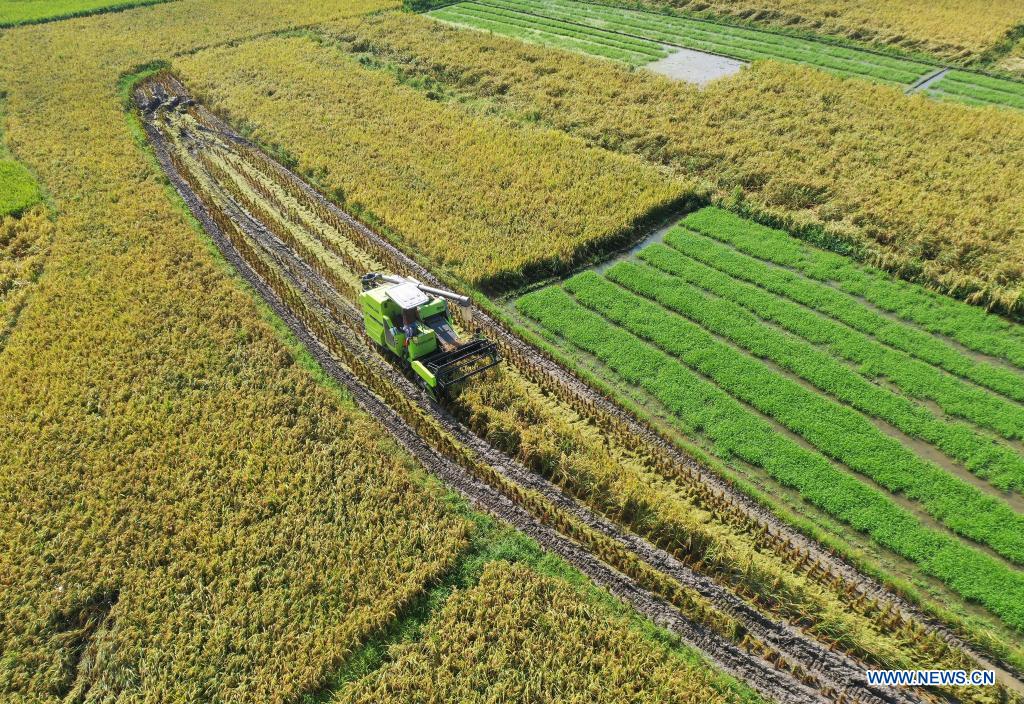
國際農(nóng)業(yè)發(fā)展基金代表貝諾特·蒂埃里和馬泰奧·馬爾基西奧認為,非洲可以從中國的農(nóng)村發(fā)展經(jīng)驗中獲益良多。20年來,國際農(nóng)業(yè)發(fā)展基金、中國和非洲一直在開展南南合作項目,促進了中非之間的知識、技術(shù)和發(fā)展解決方案交流。

The Eighth Ministerial Conference of the Forum on China-Africa Cooperation held in Dakar, Senegal, in November marked China's new commitment to Africa for the next three years on the theme of "strengthening partnership and sustainable development for a Chinese-African community with a shared future in a new era".
去年11月,中非合作論壇第八屆部長級會議在塞內(nèi)加爾達喀爾舉行,本屆會議主題是“深化中非伙伴合作,促進可持續(xù)發(fā)展,構(gòu)建新時代中非命運共同體”。會議上,中國宣布了未來三年對非合作新舉措。
In this ambitious cooperation program, agriculture, food security, and overall sustainable rural transformation have a central place given their importance to the development of African countries.
在這一雄心勃勃的合作計劃中,農(nóng)業(yè)、糧食安全和全面可持續(xù)的農(nóng)村轉(zhuǎn)型對非洲國家的發(fā)展至關(guān)重要。
There is much that Africa can benefit from China's experience in rural development. China has succeeded in feeding 1.4 billion people-about one-fifth of the world's population-with less than 10 percent of the world's arable land and less than 7 percent of the world's water resources. On the other hand, although the African continent has 60 percent of the world's potentially arable land and although agriculture production in Africa has increased 160 percent over the past 30 years, many African countries still suffer from food insecurity and a low-productive agricultural sector.
非洲可以從中國的農(nóng)村發(fā)展經(jīng)驗中獲益良多。中國用不到全球10%的耕地和不到全球7%的水資源成功養(yǎng)活了約全球五分之一的人口(14億人)。另一方面,盡管非洲大陸擁有全球60%的潛在耕地,非洲的農(nóng)業(yè)生產(chǎn)在過去30年中增長了160%,但許多非洲國家仍然面臨糧食安全問題和農(nóng)業(yè)生產(chǎn)效率低下問題。
At the International Fund for Agricultural Development, we are well placed to see how Africa can benefit from this cooperation.
國際農(nóng)業(yè)發(fā)展基金見證了非洲如何從中非合作中受益。
For two decades, the IFAD, China and Africa have been working together on South-South cooperation programs, which have facilitated the transfer of technologies and good practices between China and Africa. For instance, successful biogas digester technologies for rural households introduced by the IFAD in China's Guangxi Zhuang autonomous region in early 2000 were later replicated in several African countries through IFAD-funded projects.
20年來,國際農(nóng)業(yè)發(fā)展基金、中國和非洲一直在開展南南合作項目,促進了中非之間的技術(shù)和優(yōu)良實踐經(jīng)驗交流。例如,國際農(nóng)業(yè)發(fā)展基金于2000年初在中國廣西壯族自治區(qū)為農(nóng)村家庭引進的成功沼氣池技術(shù),后來通過該基金資助的項目在幾個非洲國家推廣。
Transfer of knowledge, technologies and development solutions between countries from the Global South-including between China and Africa-h(huán)ave also been pursued by IFAD through the establishment in 2018 of a South-South Cooperation Facility with the financial contribution of the Chinese government.
國際農(nóng)業(yè)發(fā)展基金還通過2018年在中國政府的資助下建立的一處南南合作設(shè)施,在南方國家之間(包括中非之間)轉(zhuǎn)讓知識、技術(shù)和發(fā)展解決方案。
An example of how China's experience and best practices could benefit Africa can be seen in the "Great Green Wall" initiative, a tree-planting program implemented in China since 1978 to prevent the expansion of the Gobi Desert that generated a number of benefits: it reduced the impact of dust storms, reduced soil erosion, protected China's grasslands, and helped absorb millions of tons of greenhouse gas emissions.
“綠色長城倡議”是中國自1978年就開始實施的一項植樹工程,旨在防止戈壁沙漠?dāng)U張,這項工程產(chǎn)生了諸多益處,包括減少了沙塵暴影響,減少了土壤侵蝕,保護了中國的草原,并幫助吸收了數(shù)百萬噸溫室氣體。
A similar initiative, the "Great Green Wall for the Sahara and the Sahel", is being implemented by the African Union to combat desertification in the Sahel region and restore 250 million hectares of degraded land, mainly for agricultural use. The initiative is expected to create 10 million jobs, and sequester 250 million tons of carbon. The IFAD, on its part, will lead the delivery of the Great Green Wall initiative "umbrella program", which will help promote investments to build forest resources, strengthen agro-pastoral practices and guarantee water supply, while facilitating the resolution of conflicts at the community level in the region. Such an initiative could greatly benefit from China's Great Green Wall experience.
非盟正在實施一項類似的倡議,即“綠色長城撒哈拉和薩赫勒倡議”,目的是防治薩赫勒地區(qū)荒漠化,恢復(fù)2.5億公頃的退化土地,主要用于農(nóng)業(yè)用途。該倡議預(yù)計將創(chuàng)造1000萬個就業(yè)機會,并封存2.5億噸碳。國際農(nóng)業(yè)發(fā)展基金則將牽頭實施綠色長城倡議的“總括計劃”,這將有助于促進投資,建設(shè)森林資源,加強農(nóng)牧業(yè)實踐和保障供水,同時促進解決該地區(qū)部落沖突。這樣的倡議可以從中國的“綠色長城”經(jīng)驗中受益匪淺。
But the IFAD's South-South cooperation does not focus only on technology transfer. Between 2009 and 2018, the IFAD and China jointly supported a series of South-South cooperation workshops that facilitated exchanges between Chinese and African policymakers, a major development given the role of policy dimension in promoting sustainable rural transformation and achieving Sustainable Development Goals No 1(no poverty) and No 2(no hunger).
但國際農(nóng)業(yè)發(fā)展基金的南南合作并不只集中在技術(shù)轉(zhuǎn)讓上。在2009年至2018年期間,該基金和中國共同支持了一系列南南合作研討會,促進了中國和非洲政策制定者之間的交流,這是一項重大進展,因為政策在促進農(nóng)村可持續(xù)轉(zhuǎn)型和實現(xiàn)可持續(xù)發(fā)展第一目標(biāo)(消除貧困)和第二目標(biāo)(零饑餓)中發(fā)揮了重要作用。
There is much Africa can learn from Asia in general, and China in particular, in terms of land reform. China's second land reform in 1978, for instance, is recognized as one of the key factors that triggered China's rapid economic growth and rural transformation. The reform, also known as household responsibility system, replaced collective farming by contracting cultivated land to all village households. This had positive effects on the equitable distribution of land to farmers, and ultimately on agricultural productivity, food security and poverty alleviation.
在農(nóng)村土地改革方面,非洲可以向整個亞洲,特別是中國學(xué)習(xí)很多東西。例如,中國的家庭聯(lián)產(chǎn)承包責(zé)任制被認為是觸發(fā)中國經(jīng)濟快速增長和農(nóng)村轉(zhuǎn)型的關(guān)鍵因素之一。這項改革將耕地承包給所有農(nóng)戶。這對農(nóng)業(yè)生產(chǎn)力、糧食安全和減貧產(chǎn)生了積極影響。
Finally, China-Africa cooperation does not have to be restricted to technologies and policies; it can more broadly also include "approaches". A well-noted approach in China that favoured the integration of small producers in profitable value chains, for example, foresaw the establishment of a contractual business relationship between smallholder farmers and "dragonhead enterprises", subject to meeting quality standards.
最后,中非合作不必局限于技術(shù)和政策;還可以擴大至具體做法。例如,中國一個備受關(guān)注的“做法”是支持吸納農(nóng)戶加入可盈利的利益鏈,該做法使農(nóng)戶在符合質(zhì)量標(biāo)準的前提下和“龍頭企業(yè)”之間建立合同關(guān)系。
The public sector could support smallholder farmers to develop the required quality to enter into these types of contracts with the agro-enterprises. This type of "contract farming" between smallholder farmers and large agro-enterprises is also promising in Africa, as proved during the past decades in the cotton, cocoa and market gardening sectors. And it can be extended to many other sectors in agriculture and livestock, as shown by the recent success of the poultry sector in Senegal.
政府部門可以支持農(nóng)戶提高農(nóng)產(chǎn)品質(zhì)量,達到與農(nóng)業(yè)企業(yè)簽訂此類合同所需的標(biāo)準。正如過去幾十年在棉花、可可和園藝產(chǎn)品行業(yè)所證明的那樣,農(nóng)戶和大型農(nóng)業(yè)企業(yè)之間的這種“訂單農(nóng)業(yè)”也很有希望在非洲實踐。這種做法還可以擴展到農(nóng)業(yè)和畜牧業(yè)的許多其他領(lǐng)域,塞內(nèi)加爾家禽業(yè)最近取得的成功就是明證。
Such cooperation between the public sector, the private sector and small-scale producers can lead to enormous production gains, which Africa needs in the next 30 years. But despite African agricultural growth averaging 2 percent a year over the past three decades, it has failed to catch up with population growth.
政府、私營企業(yè)和小規(guī)模農(nóng)戶之間的這種合作可以帶來巨大的生產(chǎn)收益,這是非洲未來30年所需要的。在過去三十年非洲農(nóng)業(yè)的年平均增長率為2%,但卻未能趕上人口增長。
Hence, a paradigm shift is needed for food production to keep pace with Africa's increasing population, which is expected to double by 2050. We at the IFAD believe that this type of cooperation, combined with the support programs for small producers that the IFAD is setting up, will make it possible to achieve more equitable food systems, capable of producing food of quality and providing decent incomes for producers while preserving the environment.
因此,糧食生產(chǎn)需要轉(zhuǎn)變模式,以跟上非洲人口的增長,預(yù)計到2050年,非洲人口將翻一番。國際農(nóng)業(yè)發(fā)展基金相信,通過該類型合作以及國際農(nóng)業(yè)發(fā)展基金正在建立的對小規(guī)模農(nóng)戶的支持計劃,將有可能實現(xiàn)更公平的糧食體系,能夠生產(chǎn)高質(zhì)量的糧食,并在保護環(huán)境的同時為生產(chǎn)者提供體面的收入。
There is much Africa can benefit from China's experience, and the IFAD is well-placed to facilitate such cooperation in the rural and agricultural sectors.
非洲可以從中國的經(jīng)驗中受益匪淺,國際農(nóng)業(yè)發(fā)展基金完全有能力促進農(nóng)村和農(nóng)業(yè)方面的此類合作。
來源:中國日報
作者:國際農(nóng)業(yè)發(fā)展基金塞內(nèi)加爾和薩赫勒地區(qū)項目代表貝諾特·蒂埃里,國際農(nóng)業(yè)發(fā)展基金駐華代表馬蒂奧·馬爾基西奧
編輯:董靜